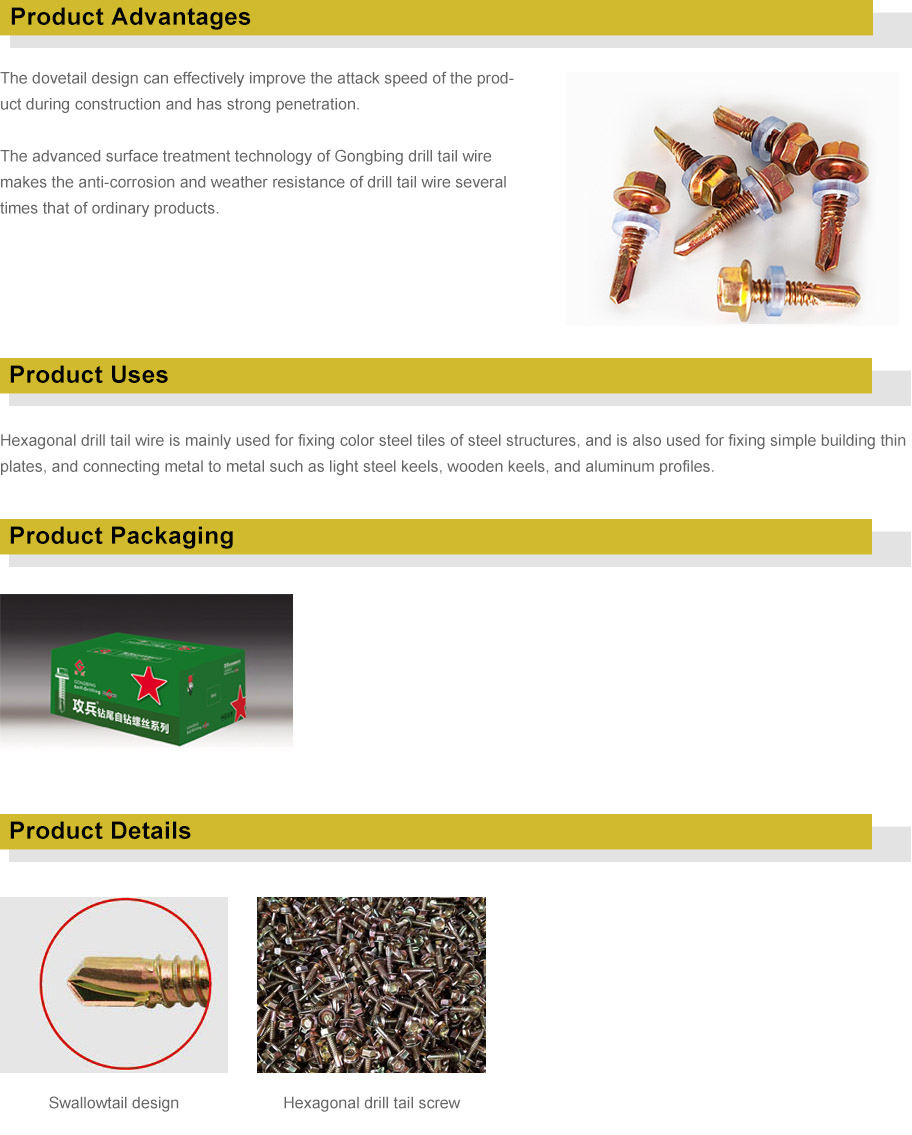self drilling cement sheet screws
Understanding Self-Drilling Cement Sheet Screws
In the world of construction and manufacturing, the choice of fasteners plays a crucial role in the integrity and durability of the structures we build. Among the various types of fasteners available, self-drilling cement sheet screws have emerged as a preferred option for many contractors and builders. This article aims to delve into what self-drilling cement sheet screws are, their applications, benefits, and best practices for use.
What Are Self-Drilling Cement Sheet Screws?
Self-drilling cement sheet screws are specialized screws designed for fastening materials like cement board and other types of sheeting. They feature a drill point at the tip which allows for the screw to create its own hole in the substrate, thereby eliminating the need for pre-drilling. This feature not only saves considerable time during installation but also enhances efficiency, particularly in large-scale construction projects.
These screws are typically made from high-quality steel with corrosion-resistant coatings to withstand harsh environmental conditions. This makes them ideal for both indoor and outdoor applications where moisture can be a concern.
Applications of Self-Drilling Cement Sheet Screws
Self-drilling cement sheet screws are primarily used in the installation of cement boards, which are commonly employed in building exteriors, roofing systems, and in areas that require moisture resistance such as bathrooms and kitchens. Additionally, they are highly effective in securing insulation boards and are frequently used in the fabrication of prefabricated buildings and modular constructions.
These screws can also be utilized in various other applications, such as
1. Drywall Installations For securing cement board to wall frames or in systems where fire resistance is necessary. 2. Transportable Infrastructure Such as mobile homes or temporary structures where lightweight yet sturdy hold is required. 3. Roofing Systems Particularly in areas where traditional screws may not provide adequate sealing or where moisture might penetrate.
Benefits of Using Self-Drilling Cement Sheet Screws
1. Time Efficiency The self-drilling feature eliminates the need for pre-drilling, significantly reducing installation time. This can lead to lower labor costs and faster project completion.
self drilling cement sheet screws

3. Precision By eliminating the need for pre-drilling, the risk of misalignment is reduced. This ensures a much more accurate and secure fastening of materials.
4. Durability Made of resilient materials and featuring protective coatings, these screws are designed to withstand the rigors of diverse building environments, thereby prolonging the lifespan of the installations.
5. Versatility They can be used with a variety of building materials, including but not limited to cement board, plywood, and other sheeting materials, making them an essential tool in any builder's arsenal.
Best Practices for Using Self-Drilling Cement Sheet Screws
To maximize the effectiveness of self-drilling cement sheet screws, here are some best practices to consider
1. Select the Right Length and Diameter Depending on the thickness of the materials being joined, choosing the correct length and diameter is critical for ensuring a secure grip.
2. Use Appropriate Tools Utilize a power drill set at the correct speed and torque settings to prevent stripping and to ensure that the screws are driven in correctly.
3. Follow Manufacturer Guidelines Adhering to the guidelines provided by the manufacturer regarding spacing and installation techniques can help to avoid common pitfalls.
4. Check for Corrosion Resistance In areas prone to moisture, select screws that have adequate corrosion resistance to ensure longevity.
5. Consider Environmental Conditions Always evaluate the environmental conditions where the screws will be used and choose products that are suited to those conditions.
Conclusion
Self-drilling cement sheet screws are a vital component in modern construction, offering numerous benefits ranging from efficiency and cost savings to durability and versatility. By understanding their applications and best practices for use, builders can ensure that their projects not only meet but exceed expectations in performance and longevity. As the construction industry continues to evolve, the importance of selecting the right fasteners remains a key factor in building’s success.
-
Weatherproof Plastic Expansion Anchors for OutdoorNewsJun.06,2025
-
Sustainability in the Supply Chain: Eco-Friendly TEK Screws ProductionNewsJun.06,2025
-
Load-Bearing Capacity of External Insulation FixingsNewsJun.06,2025
-
Double Head Bolts: Enhancing Efficiency in Industrial MachineryNewsJun.06,2025
-
Corrosion Resistance in Chipboard Screws: Coatings for Wholesale DurabilityNewsJun.06,2025
-
Butterfly Toggle Bolts : Enhancing Structural ResilienceNewsJun.06,2025
